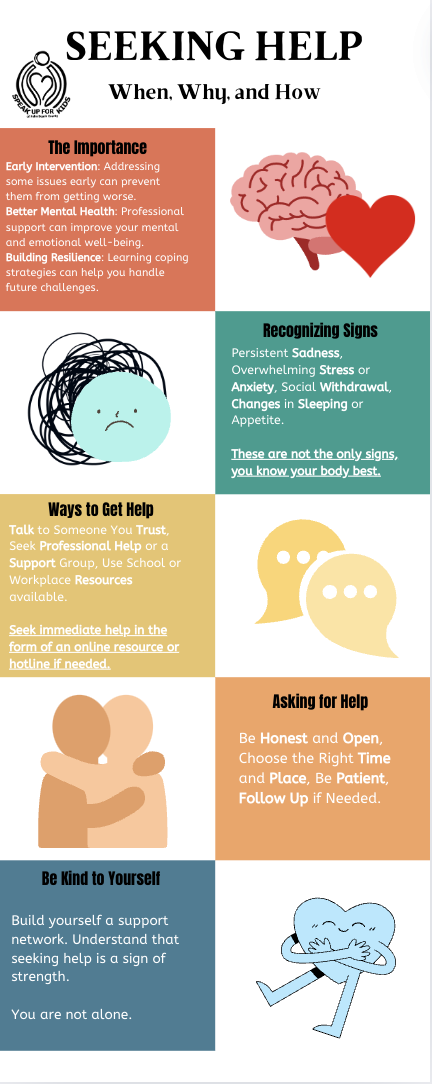Seeking Help
Contributed by Speak Up for Kids Student Intern Team — This article was developed through the combined efforts of multiple student interns, each bringing unique skills and perspectives to support life skills education for foster youth.
Overview
Reaching out for help can be a crucial step in overcoming challenges and improving your overall well-being. Whether you're dealing with emotional, mental, or practical issues, seeking support can provide you with the tools and resources you need to navigate difficult times. Here’s a guide on how to seek help and what to consider during the process.
Steps:
Recognize the Need for Help:
Self-Awareness: Pay attention to signs that you might need help, such as persistent sadness, anxiety, stress, or difficulty managing daily tasks.
Acknowledge: Accept that seeking help is a positive and proactive step towards taking care of yourself.
Identify the Type of Help You Need:
Emotional Support: If you’re struggling with feelings of loneliness, sadness, or anxiety, consider reaching out to friends, family, or a therapist.
Practical Assistance: For issues like financial problems, legal matters, or career advice, look for professional services or support groups that can provide guidance.
Find Appropriate Resources:
Professional Help: Consider consulting a mental health professional, such as a therapist, counselor, or psychiatrist, for emotional and mental health support.
Support Groups: Join support groups for shared experiences and mutual encouragement. These can be in-person or online.
Community Services: Utilize community resources such as hotlines, social services, and non-profit organizations for specific types of assistance.
Reach Out:
Contact Professionals: Make appointments with therapists, doctors, or other professionals who can help address your needs.
Talk to Trusted People: Share your feelings and concerns with friends, family members, or mentors who can offer support and advice.
Prepare for Conversations:
Be Honest: Clearly communicate your needs and concerns. Honesty is essential for getting the help you need.
Be Open: Be open to suggestions and feedback from those you seek help from. They may offer perspectives and solutions you haven’t considered.
Follow Through:
Take Action: Follow through with appointments, treatments, or advice given by professionals and supporters.
Stay Committed: Commit to the process of seeking help and be patient with yourself as you work towards improvement.
Key Questions:
What Are My Needs?
What specific issues or challenges am I facing?
What type of help do I think would be most beneficial for me?
Who Can I Reach Out To?
Who in my personal or professional network can offer support?
Are there professionals or organizations that specialize in the help I need?
What Resources Are Available?
Are there local or online resources that can provide the assistance I need?
What support groups or community services are accessible to me?
How Can I Communicate My Needs?
How can I clearly and honestly express my needs and concerns?
What information should I share to help others understand my situation?
What Steps Should I Take?
What immediate actions can I take to start getting help?
How can I create a plan to follow through with the help I receive?
How Will I Stay Committed?
What can I do to stay committed to seeking help and following through with advice and treatments?
How can I track my progress and adjust my approach if needed?
Tips:
Be Brave: It takes courage to ask for help. Remember that it’s a strength, not a weakness, to seek support.
Stay Patient: Improvement can take time. Be patient with yourself and the process.
Be Persistent: If the first person or resource you reach out to isn’t helpful, don’t give up. Keep looking for the support you need.
Practice Self-Care: Take care of your physical and emotional needs as you seek help. Rest, eat well, and engage in activities that bring you joy.
Final Thoughts
By following these steps and considering these questions, you can effectively seek the help you need to overcome challenges and improve your well-being. Seeking help is a vital part of self-care and personal growth, and taking proactive steps can lead to positive changes in your life.


